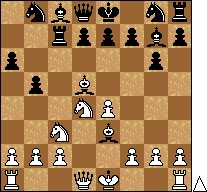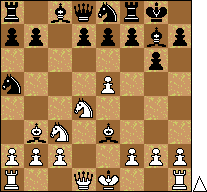They published my brilliant chess game, hinting it was not so original, but was it?
Jun 2, 2012 · 5 minute read · CommentschesscreativityoriginalitylearningSicilian Defensefather
The past couple of days, I have been writing about what I learned through playing chess as a kid. I continue today by discussion a game I played right before retiring from chess at age fifteen. This game came to my mind when I was writing about the chess computer game I played at age seven, because I played against the Accelerated Dragon of the Sicilian Defense in that game, and in my retirement tournament I also played a game against that opening.
My final tournament before I started the 11th grade and became fully absorbed in academic study was kind of special because I played reasonably well, achieving an Expert rating just as I retired, jumping from a rating of 1934 to over 2000, and because it was one of those tournaments held in East Lansing, which meant visiting and staying with my aunt and uncle and cousins.
The game I played in the Michigan Open was the second to last chess game I played in a serious tournament before returning to chess over twenty years later. It ended up being published in the following Michigan Chess magazine issue, warranting a short note that it was reminiscent of a “famous Fischer-Reshevsky debacle”.
Pride or shame? Creative or original?
When I was playing my game, I was feeling pretty proud of my winning combination, even though I knew it was not completely original; I in fact had been inspired by a theme in the Fischer-Reshevsky game that I had remembered when first encountering it in a book with my father back when I was eight years old. When I read the Michigan Chess magazine column and saw that, of course, the editor saw the resemblance, I felt deflated. As a result, I never showed my father the mention of my game in the magazine, nor did I show the game to him.
But today, I am going to display this game.
My game
In my game, I embarked on a double sacrifice combination that, if one had never seen the theme before, looks spectacular. If one had seen the theme before, it might look boring. But actually, it required accurate calculation to make the concrete variation of the theme actually work: playing simply by analogy is disastrous in chess because any small difference in a position can radically change its evaluation. So although I cannot take credit for spotting the theme, I think I can take credit for making sure that it actually applies in context.
Here is the critical position of my game, with White to play and win:

Chen-Winfield, Michigan Open 1985
Here is the critical position of Fischer-Reshevsky, US Championship 1958:

Fischer-Reshevsky, US Championship 1958
If you have not seen either game before, do you see the similarities? Can you spot the forced wins?
The full annotations
Check out my annotations of both my game and Bobby Fischer’s game. My annotations go further into what I was thinking during the game. (The game page pops up defaulting to showing my game; use the upper-right corner selection menu to switch view to Fischer’s game.)
A discussion of the theme and variations
So if you have looked through the games now, you can see that the basic theme is of trying to trap Black’s Queen and win it, and in order to avoid losing the Queen immediately, Black has to move the King out and risk being checkmated. And the key moves for White are to play Bxf7+ to remove the f Pawn that defends e6, and then Ne6 attacking the Queen. What is critical is evaluating whether Black can just take the Knight on e6 with the King and survive.
There are some real differences in how the theme plays out in my game and Fischer’s game:
- In Fischer’s game, the Queen really is trapped; and taking the Knight on e6 with the King leads to a quick forced checkmate
- In my game, the Queen is not actually trapped, because the Queen can always go to e8, but in that case, I win the rook on c7 instead; finally, in my game, Black can in fact take the Knight on e6 with the King, and this does not lead to a forced checkmate, because Black has Bxc3+ freeing up the g7 square for the King to possibly escape to.
In retrospect, I should not have been too ashamed by the resemblance to Fischer’s game, because there were real differences that lead to completely different calculations and variations in winning the game. I did have to use my own mind. The calculations are not so hard for a strong player, but I was not even at an Expert rating yet at the time, so my game was pretty good for a Class A rated player.
What I have learned
Some useful lessons I have learned upon revisiting this game:
- Having a deep background in already existing knowledge (such as already played games) helps one spot a theme and apply it in a new situation.
- There is no shame in stealing and using someone’s good idea.
- Even when stealing an idea, it requires one’s own ingenuity to make sure it works in a new context.
- Do not let your own honest judgment of your work be swayed too much by what is said about it in a publication.
- I could have been more proud of myself in front of my parents when I was a kid and shared my excitement at my personal accomplishments.